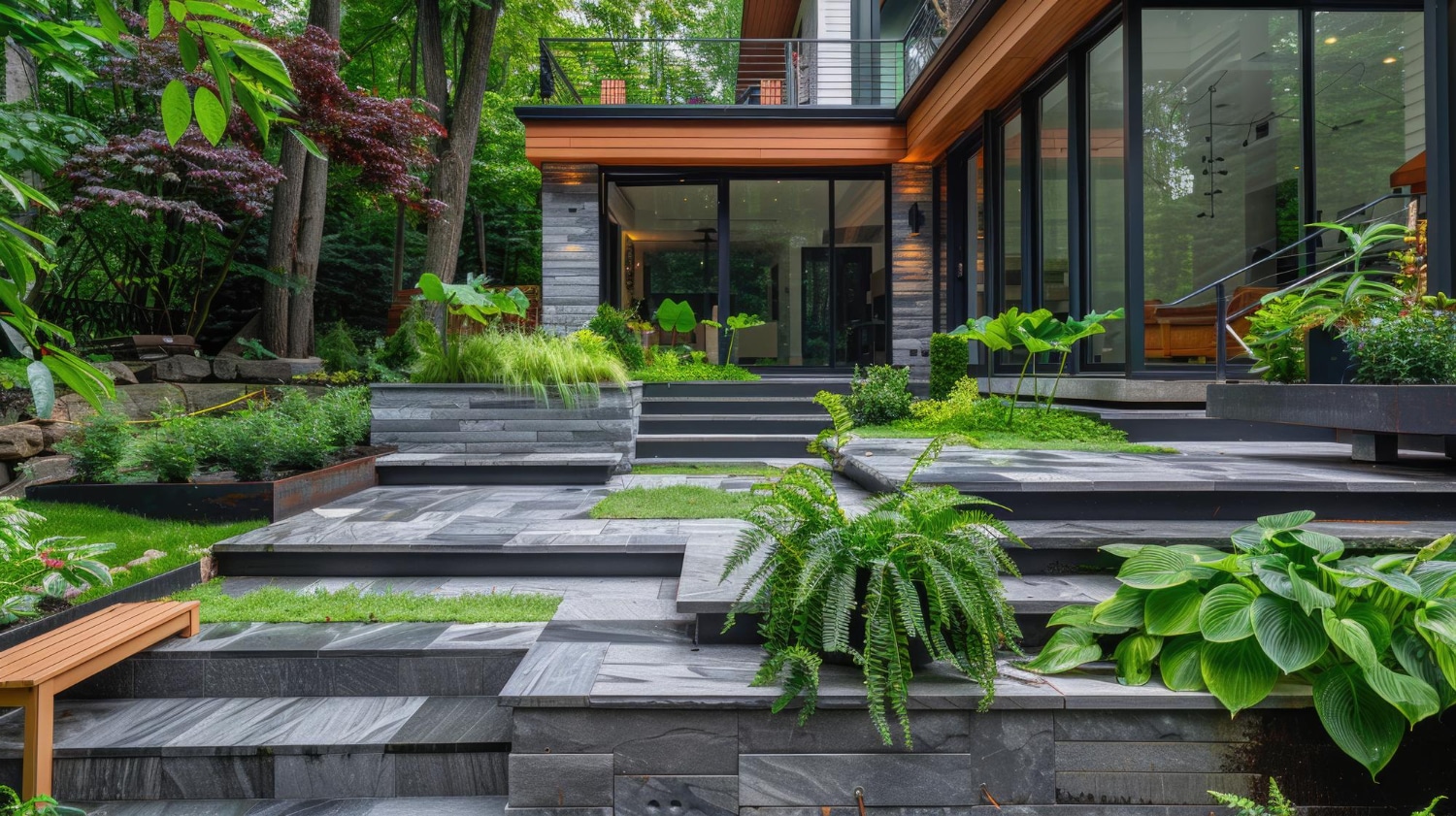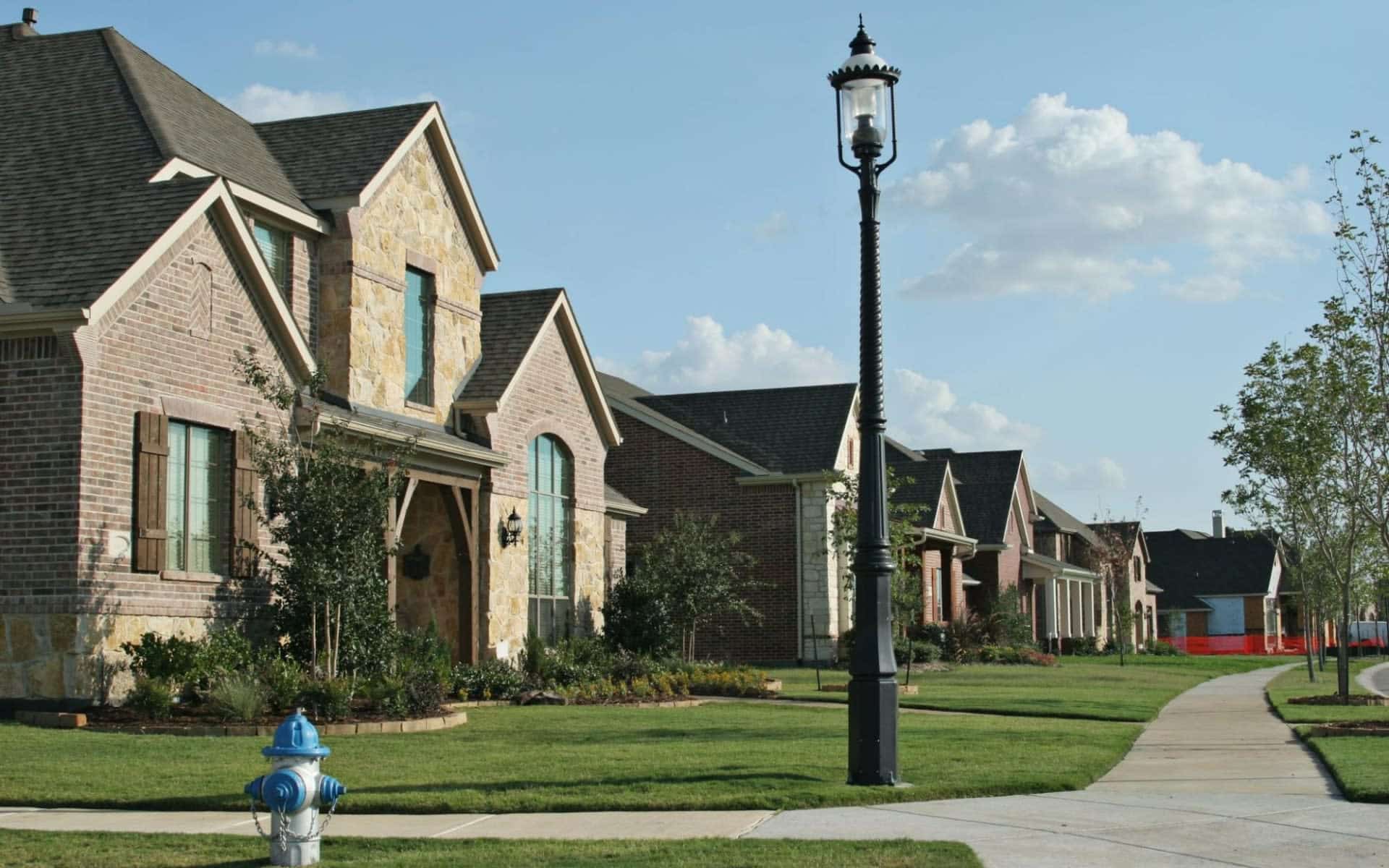Luxury home landscape design transforms ordinary outdoor spaces into stunning retreats that enhance your property’s beauty and value. We believe that thoughtful planning creates harmony between your home’s architecture and its natural surroundings, resulting in a cohesive and elegant outdoor living experience. A well-designed luxury landscape reflects your style and creates functional outdoor rooms for relaxation, entertainment, and connection with nature.
In 2025, luxury landscaping trends embrace innovative technology and sustainable practices. High-end outdoor spaces now frequently feature custom water features, premium outdoor living areas, and sophisticated lighting systems that extend enjoyment well into the evening. Many homeowners are now integrating smart irrigation systems and selecting native plants requiring less maintenance while providing year-round visual interest.
The most successful luxury landscape designs begin with a comprehensive plan that considers your home’s architectural elements and how you wish to use your outdoor space. Professional landscape architects bring valuable expertise to this process, balancing aesthetic considerations with practical needs while incorporating elements that will mature beautifully over time.
Fundamentals of Luxury Home Landscape Design
Creating a luxury landscape requires careful consideration of several key elements. The design should complement your home’s architecture while creating functional outdoor spaces that enhance your lifestyle.
Understanding the Role of Architecture in Landscaping
The relationship between your home’s architecture and landscape design is crucial, and a well-executed luxury landscape extends the architectural language of your home into the surrounding environment. Analyze your home’s key architectural features—windows, materials, lines, and proportions—before beginning landscape planning. These elements should inform your outdoor design choices.
For Mediterranean-style homes, consider courtyards with fountains and terracotta elements. Modern homes pair beautifully with clean lines, geometric patterns, and minimalist plant selections. Your landscape should create a seamless transition between indoors and outdoors. Large glass doors or windows can frame garden views, effectively bringing nature inside while extending living space outward.
The Planning Process for a High-End Outdoor Space
Successful luxury landscaping begins with thorough planning, so start with a comprehensive site analysis to identify opportunities and constraints.
Consider factors like:
- Sun and shade patterns
- Existing vegetation
- Soil quality and drainage
- Views (both to preserve and screen)
- Privacy needs
Next, develop a clear vision for how you’ll use the space. Luxury landscapes often include multiple outdoor rooms for different activities—dining areas, lounging spaces, cooking stations, and private retreats.
Budget planning is also essential early in the process, as high-quality materials and mature plantings significantly impact costs but provide immediate impact. Installation phasing can help manage larger projects while maintaining design coherence.
Selecting an Architectural Style for Garden Coherence
Your garden’s architectural style should create harmony with your home. A consistent design is based on a sophisticated, cohesive look, and popular luxury landscape styles include:
- Classical/Formal: Symmetrical designs, manicured hedges, statuary
- Contemporary: Clean lines, architectural plants, minimalist hardscaping
- Tropical Resort: Lush plantings, water features, outdoor living spaces
- Mediterranean: Terracotta, olive trees, lavender, courtyard designs
- Japanese-inspired: Zen gardens, carefully placed rocks, pruned specimens
Material selection reinforces your chosen style. Natural stone, custom metalwork, and premium hardwoods signal quality and permanence in luxury landscapes. The most successful designs also incorporate focal points—specimen trees, water features, or outdoor structures—to create visual interest and guide movement through the space.
Design Elements and Materials
The foundation of luxury landscape design lies in thoughtful material selection and strategic design elements. Quality materials and well-planned components work together to create outdoor spaces that feel both opulent and harmonious.
Hard Landscaping With High-Quality Materials
Natural stone stands as the premier choice for luxury hardscaping elements. Materials like travertine, limestone, and bluestone offer durability while providing an elegant aesthetic that concrete simply cannot match. These stones age beautifully, developing character over time.
For retaining walls and vertical elements, consider exotic options like:
- Granite for unmatched durability
- Marble for timeless elegance
- Quartzite for unique patterns and textures
Metal accents in copper, bronze, or weathered steel add sophisticated contrast when used for:
- Custom water features
- Decorative screens
- Sculptural elements
Premium wood options such as ipe and teak work wonderfully for decking and pergolas. These materials resist rot and insect damage naturally without sacrificing beauty. Their rich tones mature gracefully to silvery patinas that complement stone elements.
Choosing Furniture for Exterior Elegance
Outdoor furniture should balance comfort with sophistication, so invest in pieces that withstand the elements while maintaining their beauty. Cast aluminum frames offer excellent longevity with minimal maintenance requirements. Cushions upholstered in solution-dyed acrylic fabrics resist fading and repel moisture.
Custom-built furniture elements like stone benches or built-in seating areas create a seamless transition between hardscape and furnishings. These permanent fixtures can incorporate heating elements or lighting for year-round enjoyment. For dining areas, consider teak or ipé tables paired with comfortable seating. These create welcoming gathering spaces that encourage outdoor entertaining regardless of the season.
Incorporating Geometric Shapes in Modern Garden Designs
Geometric precision creates visual impact in luxury landscapes. Clean lines and deliberate forms establish order and sophistication while creating visual rhythm throughout the space. Balance geometric hardscaping with strategic plantings. Box hedges trimmed to perfect cubes or spheres extend the geometric theme into the softscape. These structural plants create year-round interest even when flowering species are dormant.
Consider these geometric approaches:
- Rectangular pools with infinity edges
- Circular fire features as focal points
- Linear pathways intersecting at precise angles
- Square or rectangular planting beds with crisp edges
Lighting design should emphasize these elements. Up-lighting stone walls creates dramatic shadows, while path lighting can reinforce linear elements. Strategic illumination transforms geometric designs after dark, creating entirely new visual experiences.
Plant Selection and Garden Features
The foundation of luxury landscape design rests on thoughtful plant selection and distinctive garden features. Proper plant choices and carefully planned elements create the visual impact and functionality that define high-end outdoor spaces.
Luxury Garden Plants: Perennials and Vegetation
Perennials form the backbone of luxury gardens, providing reliable beauty year after year. Choose specimen plants like Japanese maples, magnolias, and mature olive trees that serve as focal points. These statement pieces immediately elevate a garden’s prestige and create a sense of establishment. For texture and year-round interest, ornamental grasses such as Mexican feather grass and blue fescue add movement and visual appeal.
For contemporary luxury gardens, we’ve seen increasing use of:
- Structural plants: Boxwood, yew, and holly for defined edges
- Exotic varieties: Bird of paradise, banana plants, and tree ferns
- Flowering perennials: Peonies, roses, and hydrangeas for color bursts
Even vegetable gardens can be luxurious when designed with raised beds of cedar or stone, espalier fruit trees, and decorative herbs integrated among flowering plants.
Contemporary Garden Border Ideas
Modern luxury borders blend structure with softness through thoughtful plant layering, and materials that signal luxury include:
- Natural stone edging (limestone, bluestone)
- Metal edging (weathered steel, copper)
- Custom concrete curbing
Create depth by establishing three tiers: tall architectural plants at the back, mid-height flowering perennials in the middle, and low-growing ground covers at the front. For year-round interest, incorporate evergreens with varied textures alongside plants with winter appeal like red-twig dogwood and ornamental grasses that catch frost beautifully.
Lighting transforms borders after dark, and subtle uplighting on specimen plants and path lighting along border edges creates dramatic nighttime scenes that extend enjoyment hours.
Creative Elements for Urban Gardens
Urban luxury gardens maximize limited space through vertical solutions and multi-functional features. Living walls transform blank surfaces into lush tapestries of texture and color. Custom water features provide white noise to mask urban sounds while creating focal points, and options include:
- Minimalist water walls for contemporary spaces
- Spill bowls with LED lighting for evening drama
- Reflection pools with floating stepping stones
Rooftop gardens present unique opportunities for luxury through:
- Built-in seating with hidden storage
- Modular planters that can be reconfigured
- Lightweight artificial turf mixed with container plantings
Smart technology elevates urban gardens with automated irrigation, lighting controls, and even retractable awnings or pergolas that respond to weather conditions. These technological touches provide both convenience and a distinctive modern luxury appeal.
Professional Input and Legal Considerations
Professional consultants bring specialized knowledge, while proper legal compliance prevents costly mistakes and delays.
The Importance of Landscape Architects and Consultants
Landscape architects bring valuable expertise to luxury outdoor projects, combining artistic vision with technical knowledge to create spaces that are beautiful and functional. It’s advantageous to work with certified landscaping professionals who understand soil conditions, drainage requirements, and plant selection for your specific region. Their training helps avoid costly mistakes that untrained homeowners often make.
Engineers also play a crucial role in complex landscape features like retaining walls, water features, and outdoor structures. They ensure these elements are structurally sound and safe. Meanwhile, consultants help source premium materials and custom outdoor furniture. They often have relationships with furniture manufacturing companies that create bespoke pieces for luxury properties.
Navigating Planning Permission with Local Planning Authorities
Most significant landscape changes require approval from local planning authorities. Regulations vary widely between municipalities and can impact everything from fence heights to tree removal. We advise researching zoning laws and permit requirements before finalizing any design plans. Some areas have strict rules about impervious surfaces, heritage trees, and water usage.
For properties in protected areas or historic districts, additional restrictions may apply, and special permits might be needed for features like pools, large decks, or extensive lighting systems. Professional landscape designers are familiar with local codes and can help navigate the permission process. They can prepare the necessary documentation and represent your interests to planning boards.
Get in touch to discuss the luxury landscape design options that fit your home and budget.





